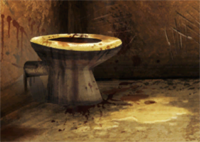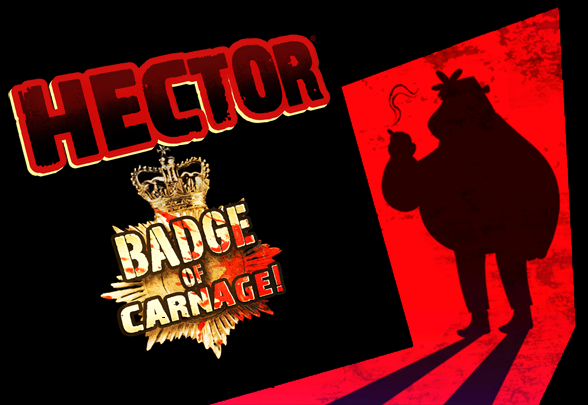“HECTOOOOR! NOOOOOOOO!”: famous last words of a character from Grim Fandango. But not every adventure game Hector must be an evil maniac; sometimes Hectors are simply foul-mouthed anti-heroes, as the recent three-part series Hector: Badge of Carnage spectacularly proves.
So what is Hector: Badge of Carnage like? If you turn off the sound and don’t follow the text for a few minutes, the game looks like some kind of Hollywood action-comedy. It’s focused on satirizing that image of a tough, macho cop, the Bruce Willis who smokes ten packs a day, wears sweaty- t-shirts, and is down on his luck. The game opens with a hostage situation in an abandoned building and a terrorist equipped with a sniper rifle; a weapon that quickly converts all policemen in the surrounding area into a huge pile of police-corpses. In a hopeless situation, who do they call? The aforementioned butch hero, of course – police detective Hector!

When you finally turn the sound back up, you’ll realize that there’s more to Hector’s satire than initially meets the eye. It’s not New York or a similarly-scaled metropolis, but some decrepit town called Clapper's Wreake, which makes Gotham City look like Disneyland. Every other location in the game is covered in feces or a different kind of filth (e.g. meat that manages to be more disgusting than feces). Every character is British (basically no local accent, slang or stereotype is spared from being ridiculed), and even our super-cop hero may be a bit “extreme” in his portrayal: he's an overweight, disgusting individual who gallivants without pants, swears without moderation and shares his lewd fantasies about Helen Mirren without shame.
So how did Telltale Games end up releasing something diverging so strongly from what we’ ve come to expect from them? The secret is that Hector started as a totally indie title created and (initially) self-published by Straandlooper for iOS platforms. Telltale mostly just took over the publisher reigns and prepared the PC version, helping a smaller studio in reaching a larger audience. Nevertheless, the production values are up to Telltale’s standards – lots of animations, cinematic cutscenes and solid comedic voice acting (done mostly by one guy). The music is alright too, but the only tunes that I still remember are the ones heard around a sex shop and inside a computer hacker's den - both very appropriate for their settings.
The plot is a competent crime story with a couple of rude twists. Nevertheless, it moves with a deliberate slow pace, so the game’s focus lies more in the humor, the colorful characters, and fun recreations of clichéd police procedurals. They even include some CSI like forensics (which sadly fail to be more disgusting than anything else Hector encounters during his investigation). Most segments of the game use Monkey Island-style “three-trials” structure – e.g. the player can fulfill the terrorist’s demands (the bulk of Episode 1) in any order he wants. This makes the game pleasantly non-linear. The puzzles themselves? Traditional item combining and conversation based - of moderate but satisfying difficulty. On occasion the player is able to switch between two different characters (Day of the Tentacle style). Worth mentioning: you won’t come across any elaborate logic puzzles whatsoever! Evidently Clapper’s Wreake Police doesn’t see the need for puzzle-for-the-sake-of-puzzle puzzle agents’ divisions.

The three episodes fit together perfectly – they’re of the exact same style with the same storyline continued throughout, but with all new characters and locations. The only major difference is that in the second and third games (named, respectively, Senseless Acts of Justice and Beyond Reasonable Doom) there are situations where you can switch control (and exchange items) between Hector and his feeble partner Lambert. Not only does that affect the gameplay, but also quite considerably changes the tone of everything. Contrary to Hector, Lambert is an extremely polite, idealistic and naive person, with mannerisms that make him look like someone from Wallace and Gromit.
The second chapter is the longest of the three, but I also feel it had a few weaker jokes; they are gross, overall, but fortunately there is a high ratio of funny ones. The final episode is made up almost entirely of a huge climax that just keeps going in new crazy directions when you think it’s already the end.
The interface needs talking about. On the one hand, it offers more interaction possibilities than the ones in Telltale games – you can examine with one click and use things with double click. Unfortunately, it’s not very consistent – very often both double click and single click examine hotspots, while in other situations a single click triggers a “hands-on” action. I found that inconsistency to be ruining my sense of control over the character somewhat. I also encountered a few annoying bugs. The first episode crashed a few times for me, a situation saved by the fact that auto-save does its thing at every step. Another bug was that in two different situations in two different episodes, the labels of key hotspots had, for some reason, become deactivated. The second episode has also some kind of memory leak bug and was working slower and slower the longer I played.
Despite the occasional technical glitches Hector remains a very enjoyable adventure game ride that in terms of writing and design is anything but quickly put together. The controversial issue for some, though, may be the relentless amounts of toilet humor, and the fact that the crass and gross situations make fun of everyone and everything. With Hector himself being a rather cynical bastard, does it make the game feel mean-spirited? Well, for the most part it didn’t feel like that to me. If anything, Hector pokes at hypocrisy and suggests some people to get off their high horses – something a proper satire should do. I wouldn’t mind if the next Straandlooper game had a few less jokes about obesity, though.
By Igor, who is too invisible for our camera.
